Here is part two of my Breastfeeding Women in the Scriptures series. Read Part 1 here if you missed it.
Hannah
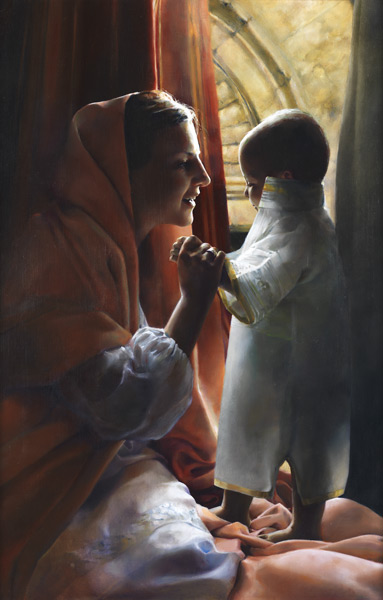 |
| “For This Child I Prayed” by Elspeth Young |
“But Hannah went not up; for she said unto her husband, I will not go up until the child be weaned, and then I will bring him, that he may appear before the Lord, and there abide for ever.
And Elkanah her husband said unto her, Do what seemeth thee good; tarry until thou have weaned him; only the Lord establish his word. So the woman abode, and gave her son suck until she weaned him.
I love this little glimpse we get into Hannah’s breastfeeding experience. I can only imagine how much she must have wrestled with herself, trying to decide if she should keep the covenant she had made to the Lord. Giving her child to the Lord must have seemed like a much easier thing to do when the child was just a hope, but much harder once she had the actual infant in her arms. It appears that she finally decided, or worked it out with the Lord, that she would take the child to the temple only after he was weaned. This may have been for practical reasons (the priests wouldn’t have been able to breastfeed him) but I think it is also indicative of how important breastfeeding and that close initial bond with a mother is to the Lord. Still, I can’t think of any woman who probably was more sad to wean her child than Hannah.
It is also impressive that Elkanah, her husband, was was supportive of her choices. We don’t get any indication that Elkanah tried to dissuade Hannah from keeping her vow to the Lord, in fact he actually reminded her of her promise. He seemed to understand that Hannah had made a covenant and he was willing to help her fulfill it, which must not have been easy for him either. Not only was he supportive of her covenant but he was also supportive of her choice to breastfeed Samuel until he was ready to be taken to the temple. Today research shows that a having a supportive partner is one of the most significant factors in determining if, and how long babies, are breastfed for. Elkanah was an equal partner to Hannah in all her choices, and I think their relationship is one that can be held up as a good example of righteous interactions between a husband and wife.
Naomi
“So Boaz took Ruth, and she was his wife: and when he went in unto her, the Lord gave her conception, and she bare a son.
And the women said unto Naomi, Blessed be the Lord, which hath not left thee this day without a kinsman, that his name may be famous in Israel.
And he shall be unto thee a restorer of thy life, and a nourisher of thine old age: for thy daughter in law, which loveth thee, which is better to thee than seven sons, hath born him.
And Naomi took the child, and laid it in her bosom, and became nurse unto it.” Ruth 4:16
It is interesting that the word that is translated as “nurse” in Ruth 4:16 is the Hebrew word “‘aman” which means, ” to support, uphold and nourish”. This word is never used in the scriptures to refer to the literal act of breastfeeding or suckling a child. Instead “aman” is most often translated as the word “believe” and is used to indicate when a person or a people allow themselves to be nourished by the word of God.
For example in Exodus 4:1 it says:
And Moses answered and said , But, behold, they will not believe (“aman”) me, nor hearken unto my voice: for they will say , The LORD hath not appeared unto thee. “
and 2 Kings 17:14
Notwithstanding they would not hear , but hardened their necks, like to the neck of their fathers, that did not believe (“aman”) in the LORD their God.
The word “aman” can also be used to refer to a foster father or a foster mother who nourishes a child. For example in Isaiah 49:23 it says:
And kings shall be thy nursing (“aman”) fathers, and their queens thy nursing (“yanaq”) mothers: they shall bow down to thee with their face toward the earth, and lick up the dust of thy feet; and thou shalt know that I am the LORD: for they shall not be ashamed that wait for me.
The phrase that is translated and “nursing fathers” is the Hebrew word “aman”. While the phrase “nursing mothers” is the Hebrew word “yanaq” which means “to suckle or to suck.”
It is significant to me that the Hebrew uses different words, with similar meanings, to differentiate between the type of role that a “nursing father” and a “nursing mother” will have to the gathered tribes of Israel. Both the words can rightly be translated as “nursing” but in the case of a “nursing mother” it indicates that her body– specifically her breasts– will literally be involved in nourishing and supporting the fledgling nations. Men, who obviously don’t have breasts that can produce milk, are able to do something similar through their responsibilities to teach and guide God’s children back to him. A “nursing father” is someone who suckles and nourishes a child of God spiritually and prepares them to return to the presence of God. Yet too often, like Moses laments, the children do not “aman”— they won’t believe, they won’t suckle– but instead harden their hearts to the milk of the gospel of Christ.
So it is very interesting that Naomi is described as being an “aman” to Obed. She was an old woman, and had not recently given birth to a child of her own, and would not have been able to physically breastfeed her grandson. Yet the scriptures indicate that Naomi did something equally important– she spiritually breastfeed her grandson. She was able to “aman” or “sustain” him by taking him to her bosom and loving, teaching, and guiding him towards Christ.
When I think of my own children’s grandmothers I see women who have chosen to take my children to their bosoms and nourish them, not only with love but with time, teaching, wisdom and kindness. In many ways they have “nursed” my children just as much as I have… filling them the milk of the gospel. I think that the use of this word “aman” to describe Naomi’s relationship with Obed is a beautiful reminder that not all women (or men for that matter) will have the opportunity to “yanaq” or “suckle” a child, but ALL women (and men) have the opportunity to “aman” or “nourish” a child.
This type of spiritual nourishment is just as vitally important as their mother’s milk.
Joash’s Nurse
“But
Jehosheba, the daughter of king Joram, sister of Ahaziah, took Joash the son of Ahaziah, and stole him from among the king’s sons which were slain; and they hid him, even him and his nurse, in the bedchamber from Athaliah, so that he was not slain. And he was with her hid in the house of the Lord six years. And Athaliah did reign over the land.” 2 Kings 11:2-3
As I wrote about in Deborah and Rebekah’s breastfeeding story the word “nurse” is used in the Bible to describe a “wet nurse”. I have written before about the incredible courage and compassion Jehosheba displayed by working to save the baby Joash from being killed by his grandmother Athaliah. Yet I had never thought about the woman (who is only named as his “nurse”) as being instilled with the same courage and compassion as Jehosheba. It is likely that this nurse was a slave woman, and so she may have just been obeying Jehosheba’s orders, but she would have fully understood the risk she was taking in saving Joash’s life. She was a woman who demonstrated great bravery and showed a true “mother heart” in risking her own life to save the life of a child that was not her own.
It is also significant to remember that Joash had to be hidden inside the temple for six years, until he was old enough to be presented before the people and his wicked grandmother kicked out of power. This means that his nurse also would also have had to go into hiding in the temple for several years while she was breastfeeding (and presumably caring for) Joash.
The sacrifices this unnamed woman made have attracted very, very little attention over the course of history, but without her the line of David (the lineage the Savior was born through) would have been lost forever. Like millions of women who came before her, and who have come after, her acts of bravery and sacrifice have gone unnoticed… but they changed the course of history.
Gomer
“Now when she had weaned Lo-ruhamah, she conceived, and bare a son.” Hosea 1:8
The story of Gomer is a complicated, yet beautiful, story and if you aren’t familiar with it I’d highly recommend reading this.
All we get about Gomer’s breastfeeding experiences is this one little line that states that after she had weaned her daughter, Lo-ruhamah, she bore another son. We don’t know how old Lo-ruhmah was when Gomer weaned her or how far apart her two children were spaced, but the verse seems to indicate that she was relying on breastfeeding as a way of spacing her children.
The type of breastfeeding that women practiced in ancient times (often called “ecological breastfeeding” today) is often much different than the type of breastfeeding that women in industrialized nations practice today. Anciently (and still in many nations around the world) women nursed their babies not only for nourishment but also for comfort. They didn’t feed their babies according to a schedule, they slept with them at night, didn’t encourage them to sleep through the night until they were weaned, and were not separated from their babies for long periods of time. They also didn’t ever have to restrict breastfeeding because it was culturally unacceptable to; breastfeeding (even with your breast showing) was always acceptable…. in all sorts of company. Being able to feed their babies like this often led to extended periods of infertility, naturally spacing children about two to two and half years apart.
I know that breastfeeding isn’t a reliable form of birth control for some women, but personally (nearly) exclusive breastfeeding has been a great way for me to space my children. My cycle doesn’t come back until my babies start on solid foods and start to sleep longer at night (usually around a year). I have tried to nurse them as long as they wanted (Asher nursed for 11 months, Rose nursed for 15 months, and Abe nursed for 13 months) and so far my body has tended to naturally space children about two or two and half years apart, which is okay with Jon and I (we have also used a the Creighton method of natural family planning as well).
Reading this line about Gomer, “when she had weaned Lo-ruhamah, she conceived, and bare a son” always makes me smile because I can totally relate to her! We get so few of the intimate details of women’s lives in the Bible and so I love it that we get this little glimpse into Gomer and Hosea’s “birth control” approach
If you are interested in reading more about ecological breastfeeding these links are interesting reads:
http://kellymom.com/bf/normal/fertility/
http://www.catholicity.com/commentary/wicker/08593.html
http://www.lalecheleague.org/llleaderweb/lv/lvdec98jan99p128.html
Mary the Mother of Jesus
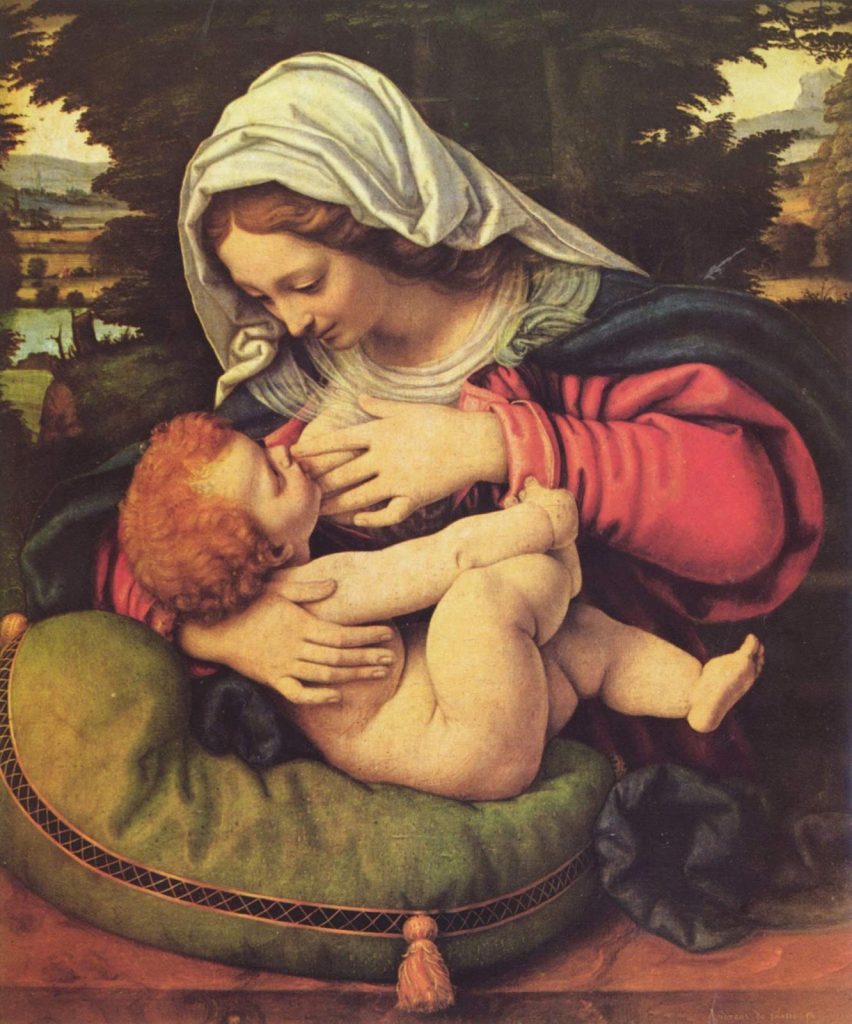 |
| Mary and Jesus by Andrea Solario |
“And it came to pass, as he spake these things, a certain woman of the company lifted up her voice, and said unto him, Blessed is the womb that bare thee, and the paps which thou hast sucked. But he said, Yea rather, blessed are they that hear the word of God, and keep it.” Luke 11:27-28
We don’t have any specific references to Mary breastfeeding Jesus, but it would be very unusual if she hadn’t. This verse in Luke 11:27-28, even though it doesn’t name Mary specifically, seems to indicate that the same woman who bore Christ also nursed him. I think we are pretty safe to assume that this verse is referring to Mary as the owner of both the womb and the paps that gave life to Jesus Christ.
The Joseph Smith Translation (JST) of this verse gives important clarity to this verse. In the KJV of the bible the verse reads like so:
“And it came to pass, as he spake these things, a certain woman of the company lifted up her voice, and said unto him, Blessed is the womb that bare thee, and the paps which thou hast sucked. But he said, Yea rather, blessed are they that hear the word of God, and keep it.” Luke 11:27-28
But in the JST translation of the bible the verse reads:
And it came to pass, as he spake these things, a certain woman of the company, lifted up her voice, and said unto him, Blessed is the womb which bare thee, and the paps which thou has sucked. And he said, Yea, and blessed are all they who hear the word of God, and keep it. JST Luke 11:27-28 (This particular JST isn’t found in the footnotes of the LDS scriptures, you have to go read the full translation)
Do you see the difference?
The JST removes the word “rather” and simply states that “Yea” the womb that bare him and the paps that suckled him are blessed. It is just one word, but it makes a big difference in the way we understand what Jesus is saying. The “rather” in the KJV makes it sound like Jesus is saying “Yes, they are blessed BUT those who hear the word of God and keep it are more blessed.” It is significant to me that Joseph Smith was instructed to remove the “rather” in this verse making it clear that Mary’s womb and her breasts were blessed and that Jesus recognized that, with no qualifications.
It is also interesting that JST included the word “and” because instead of separating the blessedness of the womb and the paps from those who hear the word of God with the word “rather”, the word “and” joins them together. It changes the meaning of verse and shows us that Christ was making a comparison between those who are physically born and nursed by a woman and those who hear the word of God and keep it.
It is no coincidence that often Christ used breastfeeding and birth metaphors to describe the work He had to do among the children of men. Women’s bodies have been designed by God to be symbols of Christ and His atonement, and the physical nursing and nurturing they do mirrors beautifully the spiritual nursing and nurturing that Christ offers to all those who will come to him and receive “milk without money and without price” (Isaiah 55:1). Mary gave physical birth and physically nursed Christ, and now Christ was offering to spiritually birth and spiritually nurse all those who were willing to accept His atonement and become His sons and daughters.
It is sweet to me that Christ, publicly and unabashedly, acknowledged His mother and her sacrifices in this powerful way.
By the way, I LOVE this picture (above) of Mary nursing Jesus. If I ever have the opportunity to remodel a mother’s lounge at church I want to hang this painting on the wall. What I love the most is the way in which the artist so perfectly captured the position that a woman uses when she breastfeeds. Everything from the way her hand cups and supports her breast, the cradle hold she is using to hold Jesus, the eye contact between mother and child, and even the pillow under baby Jesus to make breastfeeding easier (how many of us have ever used a boppy pillow for the exact same purpose!) It gives an intimate portrait of Mary that I love, and you can tell the artist really knew what a breastfeeding woman looks like. It just illustrates beautifully the phrase from Luke Luke 11:27 “Blessed is the womb which bare thee, and the paps which thou has sucked.”
Come to think of it, I should just ask if I can get a copy of this and put it on the wall in the mother’s lounge at church!

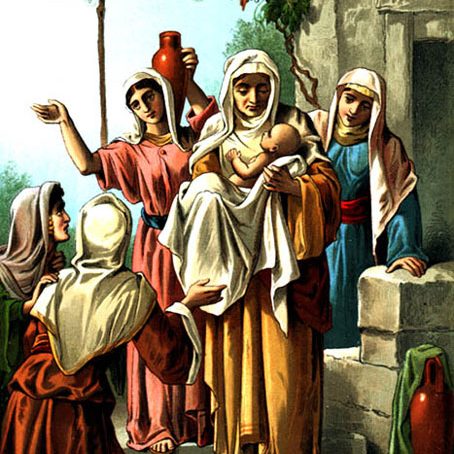
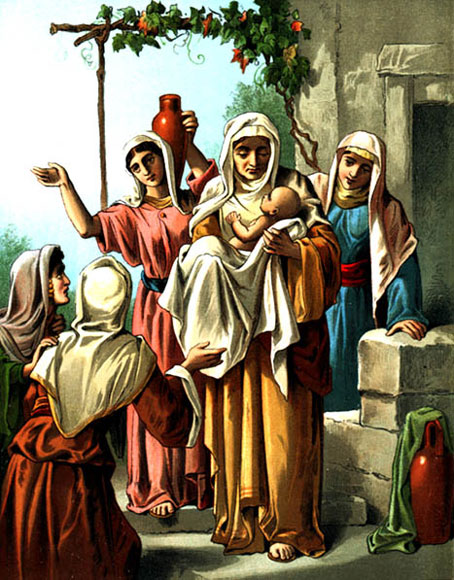
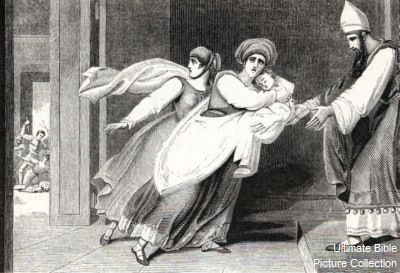
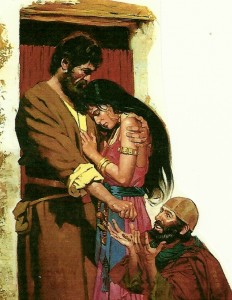







Heather, I love, love, love this!
Thanks for a wonderful post. The story of Hannah tears me apart. What conflicting emotions she must have felt!!!
Off the topic, do you have a storm shelter? I'm worried about you out there in Tornado Alley.
Well, we don't have a storm shelter but we have a basement that has a little nook where we could hunker down for a tornado if we need to. So far it is has been beautiful and quiet around here… I hope it stays that way.
LOVE this post!
I also loved the Mary nursing Christ! I love how he is playing with his foot…. and that he is round and fat. Made me wonder about those details. Only my first got round and fat like that, but then he thinned out after we weaned.
I like the idea of the picture of Mary and Jesus being in a mother's lounge, but at the same time, I think seeing that would sting a little for those of us who aren't able to nurse our babies or for those who breastfeeding didn't work out for.
Oh! I sincerely hope that women who are not able to breastfeed their babies don't feel like failures or lesser mothers. I think it is important to remember that even if you never get the opportunity to breastfeed a child, or if your breastfeeding experience goes less than optimal that the FACT still remains that you have an incredible body and that your breasts can (even if they haven't) produce food and nourishment for the human race… not to mention are symbolic of Christ. That is pretty amazing, and something that I'd hope all women can keep at the forefront of their hearts– no matter how their babies get fed.
Maybe we could also hang a picture of Deborah and Rebekah (though someone would have to paint a good one first) because Rebekah's mother wasn't able to breastfeed her for various unknown reasons (see part one). And we could put Pharaoh's Daughter up there too because she adopted Moses and never breastfed him either, but was more of a mother to him than his own mother was.
Oh! I hope I get the chance to decorate a mother's lounge one of these days!
"Like millions of women who came before her, and who have come after, her acts of bravery and sacrifice have gone unnoticed… but they changed the course of history."
Love this whole post!!
Thanks for a wonderful post. The story of Hannah tears me apart. What conflicting emotions she must have felt!I love how he is playing with his foot and that he is round and fat. Made me wonder about those details.
Online nursing courses